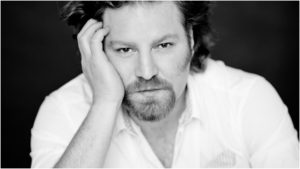
Q & A: Baritone Levente Molnar On ‘Bánk Bán’ & New York Return With Hungarian State Opera
By David SalazarBaritone Levente Molnar is one of Hungary’s great artists and in just a few weeks, he will be showcasing the treasures of his country when the Hungarian State Opera performs at Lincoln Center.
He has established a career all around the world, appearing in Zurich, Munich, Tokyo, London, Taiwan, and Freiburg, among others.
Molnar, who previously performed at the Metropolitan Opera during the 2015-16 season in such operas as “La Bohème” and “Don Pasquale,” will be performing the title role in Erkel’s “Bánk bán,” which is one of Hungary’s most cherished works.
OperaWire recently had a chance to talk to him about his return to New York (and eventual return) and the role of “Bánk Bán.”
OperaWire: You are returning to NY. What excites you most about performing for this audience?
Levente Molnar: I have had the honor to appear on stage at the Metropolitan Opera and feel the immense love and energy of the audience. The heart of the audience beats at the same time with the creative people and this gives an energy and the reassurance of the fact that making opera is the best thing in the world. I am always happy to sing in New York and will return again in 2019, but first I will sing one of the most defining roles in my career in the Hungarian State Opera’s production of Bánk Bán.
OW: You take on the title role in “Bánk bán,” which is a major opera in Hungary. Could you elaborate on the cultural experience of the work?
LM: It is a national opera for sure. For me, it represents a natural patriotic feeling and self-awareness. However, it also provides a universal ideal to follow. It contains everything about what it is to be Hungarian and human. The bitter-sweet, proud fate of the Hungarians is ours. It’s a timeless story of universal and true values, set to wonderful music and lyrics, which makes it one of the best operas in the world.
OW: How has the interpretation of the title character evolved for you?
LM: The character Bánk Bán is in every Hungarian person: an affinity for bitterness, pain, and the bearing of unbearable burdens. We like to regard ourselves as heroes, which we do not only believe, but have proved throughout history. We are tragic heroes whose primary aim and task is – apart from self-realization – to make the world a better place morally. With predecessors in the title role, such as the formidable singers József Simándy and Imre Palló, we have a very good starting point for developing the complexity of the character and for interpreting his sweet, purifying pain. During rehearsals, the director Attila Vidnyánszky paid careful attention to letting us discover and live our characters. I constantly felt an inner and outer shiver during the rehearsal period.
OW: What are the great challenges of this opera?
LM: It is always a challenge to play a hero, and perform something human or national. You need to grow to understand and almost forget we are humans. I am singing the baritone version, which requires a deep, strong presence. The conflicting energies almost tear Bánk apart. This duality is a challenge both in the staging as well as the vocal performance.
OW: How does Erkel’s music compare technically to other repertoire that you normally perform?
LM: I compare it to the tragic roles by Verdi. However, the unique characteristics of the Hungarian language make it slightly more difficult in certain musical requirements.
OW: What do you hope audiences take away from this work?
LM: The conflicts of a man loving his homeland, someone who takes upon himself the burdens of a nation as well as a musical experience to express it. Moreover, the certainty that there are values in life for which the individual, the ego, the self-interest must be put aside.
OW: Obviously Hungarian is your native language, but what are the differences in singing this language to other languages you sing in?
LM: Due to the richness of the Hungarian language some feelings can be expressed more elaborately. Those who understand Hungarian know what I mean. They can hear secret expression which (accompanied by a music base) result in intense emotional stir, catharsis even. It is of course different to sing in Hungarian than in any other language. Namely, because it is my mother tongue.
OW: What are some operas that you have not yet performed that you hope to perform in the future?
LM: I think great Verdi roles are about to find me in the near future, for which I am thankful for the title role in “Bánk Bán.” I will return to the U.S. in the autumn of 2019, to San Francisco and the Met, then I will go to Tel Aviv. And to my great satisfaction, at home, the audience of the Hungarian State Opera can see me again and again, which will forever remain the happiest encounters for me.


